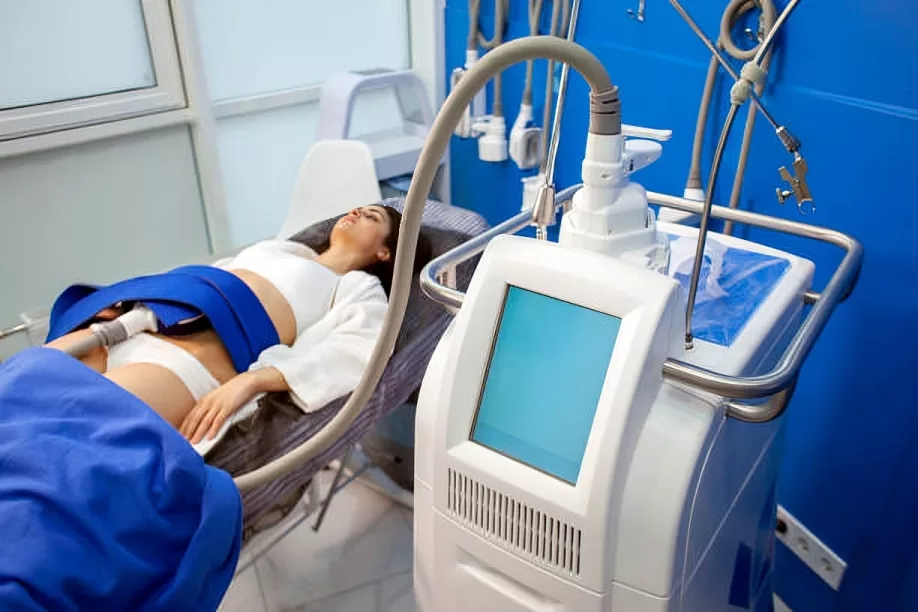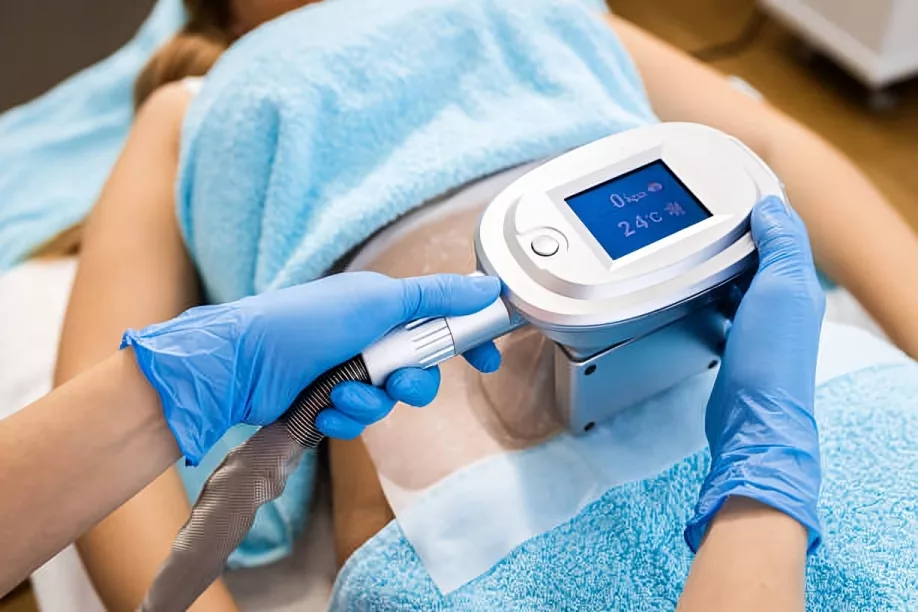Coolsculpting is a non-invasive treatment for reducing unwanted fat in your body using cryolipolysis technology. Your doctor freezes your fats first and then eliminates them. It is the best technique for contouring your body and localized fat reduction, such as in your abdomen, buttocks, thighs, breast fat, and limbs.
What is Coolsculpting?
Cool sculpting uses a method of freezing extra fats in your body and promises non-surgical fat removal. It is also known as cryolipolysis or cold panniculitis. Your doctor targets a particular area of your body and freezes the fat cells in that area. Later, these cells die, and your body replaces these fat cells with new ones without harming your skin. It gives effective results that can last many years if you take proper care.1Manstein, D., Laubach, H., Watanabe, K., Farinelli, W., Zurakowski, D., & Anderson, R. R. (2008). Selective cryolysis: a novel method of non-invasive fat removal. Lasers in surgery and medicine, 40(9), 595–604. https://doi.org/10.1002/lsm.20719
Indications of Coolsculpting
The following are indications of cool sculpting:
- Abdominal fat (too much fat in your stomach area)
- Thigh fat (excessive fats in thighs that give a poor appearance to your body)
- Double chin (fat deposits under your chin)
- Arm fat (bulky upper arms)
- Love handles (fat bulges in the flanks or sides)
- Back fat (too much fat in your upper and lower back)
- Bra fat (excessive fat in the bra line area)
- Fat bulges anywhere in the body
Which Candidates Are Ideal for Coolsculpting?
Ideal candidates for cool sculpting are:
- Adults
- People with body mass index (BMI) of thirty or less than thirty
- People who prefer non-invasive fat removal rather than surgical techniques
- Stubborn fat that is very difficult to lose
Contraindications of Coolsculpting
The following are the contraindications of cool sculpting:
- Obesity (body mass index of more than thirty)
- If you have implants or tattoos in the target area
- Pregnant ladies
- Breastfeeding women
- People having cryoglobulinemia
- People with systemic diseases like diabetes and cardiovascular diseases
How to prepare a patient for Coolsculpting?
For preparing a patient for cool sculpting, the following steps are important:
History:
Your doctor may ask the following questions before the cool sculpting procedure:
- Do you have any diseases, such as cryoglobulinemia, Raynaud’s disease, cold agglutination, or any other systemic disease?
- Are you taking any medicines, particularly the drugs that make your blood thin?
- They might ask you if you have been pregnant or breastfeeding recently. Moreover, they ask about your past surgical history.
Examination:
The doctor will examine you thoroughly, particularly the doctors focus on assessing your weight, body mass index (BMI), skin tone, skin elasticity, and fat thickness of your skin.
Investigations:
Your doctor might advise you to do the following investigations to check your fitness for the process of cool sculpting:
- Complete blood count
- Blood glucose levels
- Lipid profile
- Blood chemistry
Informed Consent:
Your doctors will counsel you about the complete procedure of cool sculpting. After telling you about the steps of the procedure and any associated risks, they will ask you to sign a document as proof of your informed consent. It is mandatory for you to sign this consent paper before surgery.
What precautions should be adopted before Coolsculpting?
Follow these precautions before the procedure of cool sculpting:
- Give your doctor a complete medical and surgical history.
- Drink plenty of water before and after the procedure.
- If you are using any medicines like aspirin and warfarin, do not take them before the procedure.
- Remove any jewellery or clothing from the target area before the procedure starts.
- Avoid wearing tight clothes before surgery to allow easy access to the area of surgery.
Step By Step Procedure of Coolsculpting
There are the following steps of cool sculpting after you reach the table of procedure:
Marking:
The doctor marks the target area of your skin for cool sculpting to ensure the correct placement of instruments.
Gel Pad Application:
Then, they apply a gel pad to your skin to protect it against a very cold temperature.
Placement Of Applicator:
After this, they place the applicator on the target area of your skin.
Cooling:
The applicator cools your skin to about minus eleven degrees Celsius or twelve Fahrenheit for about half an hour.
Massaging:
The doctor massages your skin area to break down the fat cells in it.
Follow Up:
The doctors give you multiple sessions, repeating sessions after four to six weeks. Moreover, they advise follow-up to monitor the progress and results.

What precautions should be adopted after Coolsculpting?
Aftercare of cool sculpting includes the following steps:
- Follow post-operative instructions and medicines if your doctor advises any.
- Take proper rest and avoid strenuous exercises.
- Massage your target skin area gently for fat breakdown and reduce discomfort.
- Drink plenty of water.
- Keep monitoring for any adverse effects, and contact your doctor if you observe any side effects.
- Avoid sun exposure, cooking, bathing with hot water, and high temperatures.
- Wear loose clothing after the procedure.
- Take proper follow-up and maintain a healthy lifestyle.
Complications or Risks of Coolsculpting
Coolsculpting is a noninvasive procedure that has been declared safe by the Food and Drug Administration (FDA). There are not many complications with this procedure. Moreover, there is no chance of alteration in liver function or serum lipids.2Klein, K. B., Zelickson, B., Riopelle, J. G., Okamoto, E., Bachelor, E. P., Harry, R. S., & Preciado, J. A. (2009). Non-invasive cryolipolysis for subcutaneous fat reduction does not affect serum lipid levels or liver function tests. Lasers in surgery and medicine, 41(10), 785–790. https://doi.org/10.1002/lsm.20850
However, some temporary side effects, such as numbness, swelling, tingling, aching, stinging, bruises, and cramps, may occur after the procedure.
Moreover, there are rare chances of developing adipose hyperplasia, frostbite, nerve damage, infection, abscess, hyperpigmentation, scarring, and uneven fat reduction.
There are some serious but rare complications like compartment syndrome, vasculitis, or fat embolism.
How effective is Coolsculpting for fat reduction?
Coolsculpting is very effective for reducing excessive fats from the selected areas of your body. According to a study, it reduces twenty to eighty percent of fat in your body. Fat reduction occurs within three months after the procedure.3Nelson, A. A., Wasserman, D., & Avram, M. M. (2009). Cryolipolysis for reduction of excess adipose tissue. Seminars in cutaneous medicine and surgery, 28(4), 244–249. https://doi.org/10.1016/j.sder.2009.11.004
Is there a need for Anaesthesia for Coolsculpting?
Coolsculpting does not require anesthesia as it is a non-invasive procedure that does not use needles or incisions. However, some patients may experience cramps, burning, or discomfort. If you experience pain or discomfort, your doctors might prescribe topical anesthesia, oral sedation, massage, or painkillers.
Coolsculpting Vs. Liposuction:
| Coolsculpting | Liposuction | |
| Definition | It is a technique for freezing excessive fats from selected areas of the body, killing and reducing them.
It is also known as cryolipolysis or cold panniculitis. |
Liposuction is a surgical procedure of removing excessive fat by suction.
It is also known as “lipoplasty” or “fat modeling.” |
| Nature of procedure
Procedure |
It is a non-invasive procedure, and generally, anesthesia is unnecessary for this.
The doctor selects the target area, applies a temperature of minus eleven degrees Celsius that freezes the fat cells, and then massages the area, and the fat cells die as a result. |
It is an invasive procedure and requires anesthesia to perform.
In liposuction, your doctor gives you anesthesia, makes a small incision, introduces a cannula through this site, and applies suction to remove extra fat. Then, they close the area and apply compression. |
| Areas
Efficacy And Results |
It is for selected areas of fat like buttocks, thighs, belly, and breasts.
It has slow results, but efficacy is high. But it can not reduce your body weight. |
It is for larger areas of fat or multiple areas, such as belly fat, neck, face, arms, and thighs.
It is more effective with immediate and long-lasting results and also reduces your body weight. |
| Complications And Risks | Generally, there are no compilations of cool sculpting, but some complications, like bruising, swelling, redness, and pain, may occur temporarily. | There are many severe complications of liposuction, like postoperative pain, bruising, anesthesia complications, infection, and scarring. |
Coolsculpting Disfigurement
Generally, cool sculpting is a safe procedure, but rare possible disfigurement from cool sculpting includes:
Paradoxical Adipose Hyperplasia:
It is a very rare complication of cool sculpting. Fat cells overgrow in the target area and become very large. The incidence is 0.0051 percent.4Jalian, H. R., Avram, M. M., Garibyan, L., Mihm, M. C., & Anderson, R. R. (2014). Paradoxical adipose hyperplasia after cryolipolysis. JAMA dermatology, 150(3), 317–319. https://doi.org/10.1001/jamadermatol.2013.8071
Asymmetry:
Uneven fat reduction can affect the contour of your body, and it looks irregular.
Skin Laxity:
The skin may become loose due to fat reduction.
Numbness:
Numbness, paraesthesia, tingling, or altered sensorium may occur in the target skin area.
Bruising:
Temporary bruising may occur in the skin, or hematoma can form due to blood accumulation.
Infection:
Infection of the skin can occur in cool sculpting.

Alternative Therapies to Coolsculpting
The following are alternative options for cool sculpting:
Radiofrequency Treatments:
Radiofrequency treatments include heat-based treatments like Accent, Thermage, and Venus Freeze to stimulate collagen formation and enhance fat reduction in your body.5Zelickson, B. D., Kist, D., Bernstein, E., Brown, D. B., Ksenzenko, S., Burns, J., Kilmer, S., Mehregan, D., & Pope, K. (2004). Histological and ultrastructural evaluation of the effects of a radiofrequency-based nonablative dermal remodeling device: a pilot study. Archives of dermatology, 140(2), 204–209. https://doi.org/10.1001/archderm.140.2.204
Carboxytherapy:
It uses carbon dioxide gas to improve circulation and stimulate fat reduction in your body.
Laser Lipolysis:
It uses a laser beam to destroy your fat cells, like Slimlipo or laser Lipolysis. According to a study, the use of low-level laser beams like 635 nanometers has given promising results for fat reduction.6McRae, E., & Boris, J. (2013). Independent evaluation of low-level laser therapy at 635 nm for non-invasive body contouring of the waist, hips, and thighs. Lasers in surgery and medicine, 45(1), 1–7. https://doi.org/10.1002/lsm.22113.
Ultrasound Cavitation:
It uses ultrasound waves to destroy your fat cells, like liposonix or UltraShape. Moreover, high-intensity focused ultrasound lipolysis (HIFU) is in practice for fat reduction, which is safe and effective for fat reduction.7Shalom, A., Wiser, I., Brawer, S., & Azhari, H. (2013). Safety and tolerability of a focused ultrasound device for treatment of adipose tissue in subjects undergoing abdominoplasty: a placebo-control pilot study. Dermatologic surgery: official publication for American Society for Dermatologic Surgery [et al.], 39(5), 744–751. https://doi.org/10.1111/dsu.12123.
Electrical Muscle Stimulation:
Electrical muscle stimulation like Em Sculpt tones your muscles and facilitates fat reduction in your body.
Liposuction:
It involves the use of suction to reduce fats from your body.
Acoustic Waves Therapy:
It uses low-frequency sound waves like Storz shock waves to reduce fat in your body.
Massage Therapy:
Massage therapies include manual or vacuum massage to enhance your body’s circulation and reduce fats.
Infrared Therapy:
It uses infrared waves for fat reduction and improving your body’s circulation.
Diet & Exercise:
A healthy diet and exercise also help in maintaining your body’s weight and prevent excessive fat accumulation.
Is Coolsculpting painful?
Coolsculpting is a non-invasive procedure, and there is relatively less pain than other therapies. However, you may experience pain during the application of suction or due to extreme cold. You may experience sensations like pulling, burning, pinching, numbness, or stinging. Sometimes, you may have skin reactions if your skin is hypersensitive. Moreover, you may experience soreness for about a week after cool sculpting.
Will the fat come back into the body after Coolsculpting?
Coolsculpting reduces the number of fat cells in the target area. As the number of fat cells remains constant after puberty, they might grow large or small in weight gain or loss. Coolsculpting reduces the number of fat cells in your body so,it can not store as much fat as before treatment and the area remains contoured even after weight gain.
Is Coolsculpting an Effective Method for Fat Reduction Or Body Contouring?
Coolsculpting is not a method of weight reduction. As it is a method to remove stubborn fats that can not be reduced by exercise, it can also improve the contour of your body. Additionally, if you have a body mass index (BMI) of more than thirty, you can not even go for cool sculpting. Moreover, if you have an ideal body weight, you will have more effective results in cool sculpting. Hence, it is effective for improving your body’s contour and has a higher rate of success and patient satisfaction.8Stevens, W. G., Pietrzak, L. K., & Spring, M. A. (2013). Broad overview of clinical and commercial experience with CoolSculpting. Aesthetic Surgery Journal, 33(6), 835–846. https://doi.org/10.1177/1090820X13494757
Conclusion
Coolsculpting is a non-invasive, non-surgical method for effective fat reduction in your body. It uses the technique of freezing excessive fats in your body, which destroys them, and your body contour improves. Coolsculpting is effective for the reduction of stubborn fat deposits in the selected areas of your skin, like thighs, buttocks, love handles, breast fat, arms, and legs. It is a relatively safe procedure that generally needs no anesthesia, and there are fewer side effects.
Refrences
- 1Manstein, D., Laubach, H., Watanabe, K., Farinelli, W., Zurakowski, D., & Anderson, R. R. (2008). Selective cryolysis: a novel method of non-invasive fat removal. Lasers in surgery and medicine, 40(9), 595–604. https://doi.org/10.1002/lsm.20719
- 2Klein, K. B., Zelickson, B., Riopelle, J. G., Okamoto, E., Bachelor, E. P., Harry, R. S., & Preciado, J. A. (2009). Non-invasive cryolipolysis for subcutaneous fat reduction does not affect serum lipid levels or liver function tests. Lasers in surgery and medicine, 41(10), 785–790. https://doi.org/10.1002/lsm.20850
- 3Nelson, A. A., Wasserman, D., & Avram, M. M. (2009). Cryolipolysis for reduction of excess adipose tissue. Seminars in cutaneous medicine and surgery, 28(4), 244–249. https://doi.org/10.1016/j.sder.2009.11.004
- 4Jalian, H. R., Avram, M. M., Garibyan, L., Mihm, M. C., & Anderson, R. R. (2014). Paradoxical adipose hyperplasia after cryolipolysis. JAMA dermatology, 150(3), 317–319. https://doi.org/10.1001/jamadermatol.2013.8071
- 5Zelickson, B. D., Kist, D., Bernstein, E., Brown, D. B., Ksenzenko, S., Burns, J., Kilmer, S., Mehregan, D., & Pope, K. (2004). Histological and ultrastructural evaluation of the effects of a radiofrequency-based nonablative dermal remodeling device: a pilot study. Archives of dermatology, 140(2), 204–209. https://doi.org/10.1001/archderm.140.2.204
- 6McRae, E., & Boris, J. (2013). Independent evaluation of low-level laser therapy at 635 nm for non-invasive body contouring of the waist, hips, and thighs. Lasers in surgery and medicine, 45(1), 1–7. https://doi.org/10.1002/lsm.22113.
- 7Shalom, A., Wiser, I., Brawer, S., & Azhari, H. (2013). Safety and tolerability of a focused ultrasound device for treatment of adipose tissue in subjects undergoing abdominoplasty: a placebo-control pilot study. Dermatologic surgery: official publication for American Society for Dermatologic Surgery [et al.], 39(5), 744–751. https://doi.org/10.1111/dsu.12123.
- 8Stevens, W. G., Pietrzak, L. K., & Spring, M. A. (2013). Broad overview of clinical and commercial experience with CoolSculpting. Aesthetic Surgery Journal, 33(6), 835–846. https://doi.org/10.1177/1090820X13494757

